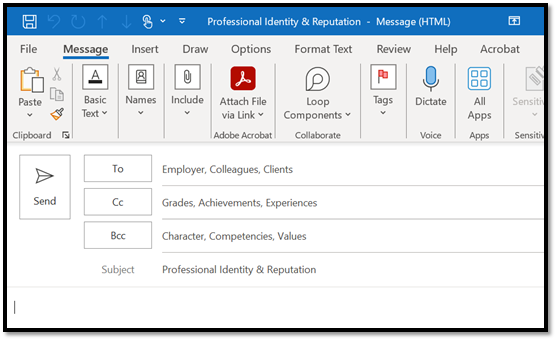I loathe the term “soft skills.”
Framing important attributes like teamwork, critical thinking, emotional intelligence, communication, attitude and work ethic as “soft” make them seem just that: soft, cute, full of fluff. In other words, the “bonus” skills — the ones that are nice and fun to have, but not nearly as important as IQ and legal expertise.
But pause for a second and think of someone you professionally admire. I’m sure a part of your admiration stems from their competence and technical mastery… but I bet it is more than that. Maybe it’s their humility, self-deprecating humor, organization skills, drive or quiet confidence. Maybe it’s the way they communicate or the way they lead meetings, the way they manage disagreement or the way they adapt to change, the way they take constructive feedback or the way they remain unflappable during times of crisis.
How soft of them.
I think some of the resistance to acknowledging the importance of “soft skills” stems from apprehension about one’s ability to teach or learn them. You can’t exactly master the art of “people-ing better” by reading a textbook or memorizing answers to multiple choice questions.
And so, we treat hard skills as learnable and expandable (If you just study hard enough and practice hard enough, you’ll figure it out) and soft skills as innate and fixed (You just are the way you are; your personality isn’t going to change).
But what if we flipped the script on that narrative? What if we began to think of soft skills as learnable, expandable AND indispensable to success? Better yet, what if there was a simple framework that could help you start working on them today?
The RPA Framework
Reframe: Mind your BCCs
Two common misunderstandings about soft skills tend to undermine our ability to recognize how important and pervasive they are in both our personal and professional lives.
Myth #1: “Without soft skills, I still break even.” Soft skills are often thought of as “extra” or “bonus” attributes. Therefore, if you don’t excel at any given soft skill, we still believe it leaves us at net neutral, not a deficit.
Myth #2: “Soft skills are always employed intentionally.” We believe soft skills are like words and actions: They only appear when we purposely direct them at others.
But the truth is that soft skills are two-sided coins that we often emit without intention.
Think of your professional identity and reputation within the framework of a typical email. The “To” field consists of the specific people you are conveying any given message towards (your professors, supervisors, bosses, etc.). The “CC” field consists of the visible, traditional credibility boosters that accompany your action (your title, education, resume, accomplishments, etc.).

This is usually where our exploration of professional identity and reputation ends. But it shouldn’t. There’s also the “BCC” field, in which we — sometimes unintentionally — transmit our Basic Characteristics & Competencies: invisible soft skills (or lack thereof) that attach to our every move and message.
Example: An attorney sends an email to their client. It provides accurate and well-reasoned advice, but does not include any kind of personal greeting, is a week overdue and contains some typographical errors. Their CCs are intact: They still have a J.D. and an impressive resume. Their hard skills are on-point: The advice they provided was accurate. But what are they silently sending in their BCC field? A few attributes come to mind: sloppy, unreliable, cold, distracted, busy, careless. While the attorney didn’t intentionally communicate any of those things to their client, that is likely what their client read between the lines.
Again,soft skills are two-sided coins that we often emit without intention. That attorney didn’t just not demonstrate timeliness or consideration; they affirmatively BCC:ed the flip sides of those coins: procrastination and disregard. Were these silent signals intentional? Of course not. But our unconscious habits can manifest as these “flip side” BCCs and wreak havoc on our professional reputation and credibility.
Personalize: How do you want others to describe you?
It’s great to want to “improve your soft skills,” but what specifically does that mean to you?
Professional sustainability requires you to be both effective and authentic. There are a million different ways to be a great lawyer: The key is to figure out what that looks like for you. One way to do that is to ask yourself a simple question: “How do I want others to describe me when it comes to X?” For example, “How do I want my professors to describe me as a student?” (e.g., engaged, prepared, punctual, curious, responsive). Or “How do I want my classmates to describe me as a leader?” (e.g., authoritative, understanding, collaborative, efficient, progressive). Or “How do I want my boss to describe me as a problem-solver? (e.g., strategic, creative, intuitive, dogged, patient). It is important to note that there is no objective “right” answer to these questions: The best answer is the one that feels right to you.
These unique aspirational descriptors then become your personal benchmarks for success: Do the BCCs you send align with these qualities? Are you putting in the work to earn the professional reputation you desire? Are you actually walking the walk — or just talking the talk?
Apply: What does that look like in practice?
The final step requires you to reconcile your aspirations with reality: to figure out how to consistently incorporate the descriptors you identified into your BCC field. To do so, you must look both inward and outward, asking questions of yourself and of others in the field whom you respect and admire.
If I want my professors to describe me as engaged, what does that look like in practice?
If I want my boss to describe me as a go-getter, what does that look like in practice?
If I want my classmates to describe me as collaborative, what does that look like in practice?
Once you answer these questions, it is time to critically and honestly evaluate your performance (i.e., how well you have been walking the walk). If you want your professor to describe you as engaged, are you consistently participating during class and making eye contact during lecture? If you want your boss to describe you as a go-getter, are you proactively asking for new projects and opportunities? If you want your classmates to describe you as collaborative, are you listening to their ideas and supporting their initiatives?
In the end, the equation is simple: If you want people to describe you as X, you have to do X. This is how soft skills are both taught and learned: through introspection, observation and practice. Identify your values, evaluate your BCCs, and commit to putting both into action.
The truth is: It takes hard work to be soft…
Good thing you can do hard things.
[BCC: self-awareness; work ethic; determination; growth]
After a decade serving the judiciary in various capacities, Jillian Boone currently serves as a lecturer and the assistant director of externships at the The Ohio State University Moritz College of Law.

